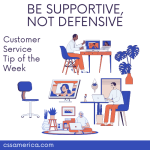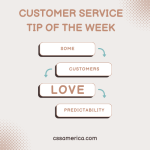
I was talking to a client recently, and we discussed the importance of relationship-building in their position. So I asked, “How do you develop a relationship?”
The client offered several points, one in particular piqued my interest – she said: “I have to understand how I communicate, and I have to be open to communicating differently.”
Essentially, she conveyed that she had to be self-aware, and she had to be willing and able to tweak her communication style to best work with the customer.
Being able to recognize what works with each client, knowing how to change, and being willing to change your style of communication based on the situation or the individual involved is a high-level customer service skill.
You have to know when to slow down your pace of talk based on how the other person prefers to communicate and how well they are understanding what you’re saying. You have to know when to sit or stand, lean-in or sit back based on what makes them more comfortable or builds their confidence.
You have to be willing to pick up a phone and call somebody even though you prefer e-mail, or be willing to meet with someone even though you prefer not to make the drive. Sometimes they want to text even though you have an aversion to doing that in business.
This is not to say we have to change who we are in any way. This is to say that if we want to deliver a great experience and build relationships, we have to understand each unique customer and what about their experience with us builds their comfort and confidence level. And since some of those experiential characteristics are communication-related on our part, we need to make the refinements necessary to build that client relationship.
Learn when and how to change your style on the fly.
Signup for FREE Tips! Contact Us More Resources for You Visit Our Home Page























